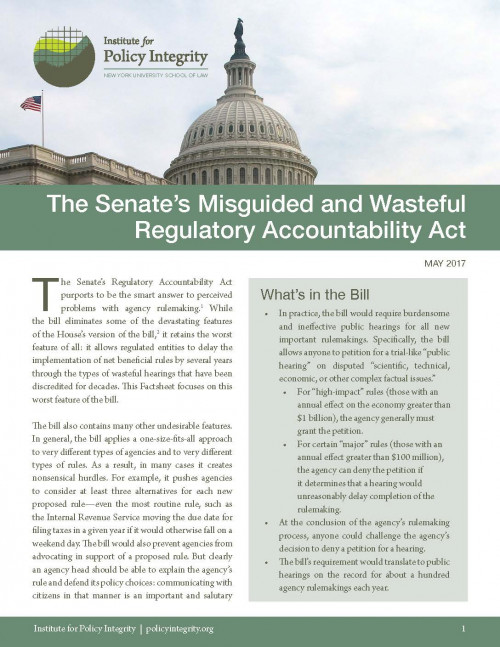-
Senate Regulatory Reform Bills
Several bills that recently won Senate committee approval could have devastating impacts on the efficiency and effectiveness of government. Our new fact sheets describe the dangers of these bills.
-
Comments on California Electricity Policy Order Instituting Rulemaking to Create a Consistent Regulatory Framework for the Guidance, Planning, and Evaluation of Integrated Distributed Energy Resources
California’s state government is moving forward on electricity and climate policy, likely setting a blueprint for future state and federal action. We submitted comments to the California Public Utilities Commission (CPUC) on factual disputes flagged by stakeholders, related to how utilities will use cost-benefit analysis in decisionmaking. We encouraged staff at CPUC to use the Social Cost of Carbon for its interim greenhouse gas adder, use a 3% discount rate for future damages, include other environmental externalities like air pollution in its analysis, and continue considering societal costs to ensure that the benefits justify the costs of a proposed policy.
-
Comments on EPA’s Proposal to Further Delay the Amendments to the Risk Management Program
We recently submitted comments on the Environmental Protection Agency’s proposal to delay the effective date of EPA’s amendments to the Risk Management Program for twenty more months and to put off the compliance deadlines indefinitely. The original rule was issued under section 112®(7)(A) of the Clean Air Act and updated chemical accident prevention rules at manufacturing plants, after a fatal explosion at a fertilizer plant in West Texas.
-
Comments to EPA on Evaluating Existing Regulations
We recently submitted comments to the Environmental Protection Agency (“EPA”) regarding its obligation to evaluate existing regulations and identify some for repeal, replacement, or modification under Executive Order 13,777. Our comments are meant to ensure that EPA stays focused on its objective to identify outdated, unnecessary, ineffective, or net-costly regulations for repeal, replacement, or modification and does not prioritize recently promulgated and overwhelmingly cost-benefit justified rules, some of which have been targeted by industry commenters.
-
Resources on Congressional Regulatory Bills
The House of Representatives has passed several bills that could have devastating effects on the federal regulatory process. To help journalists and policymakers understand the potential impact of some bills currently moving through Congress, we recently published a series of fact sheets.
-

The Senate’s Misguided and Wasteful Regulatory Accountability Act
The Senate’s Regulatory Accountability Act would rewrite notice-and-comment rulemaking procedures and create extraordinarily burdensome hurdles in rule implementation by requiring trial-like public hearings. Our issue brief describes how this change to regulatory reform would give opponents of major public safeguards a valuable tool to delay implementation for years, without any regard to the harm that delay would impose on the health and safety of the American public.
-
Comments to the Office of Natural Resources Revenue on the Reform Rule
We recently submitted two sets of comments to the Office of Natural Resources Revenue (ONRR), making the case against repealing an Obama-era reform that promised to recover millions of dollars in royalties from mining companies—a reform that would have ensured that taxpayers receive fair market value for the use of public lands. Our first set of comments objects to the proposed repeal of the Consolidated Federal Oil & Gas and Federal & Indian Coal Valuation Reform Rule (the “Reform Rule”), while our second set responds to ONRR’s request for comments on whether revisions are necessary to the regulations governing coal, oil, and gas royalties. We previously submitted comments to ONRR on the proposed Reform Rule.
-
Comments on U.S. Army Corps of Engineers Environmental Impact Statement
President Trump’s recent executive order on energy disbands the Interagency Working Group on the Social Cost of Carbon (IWG) and withdraws its technical support documents that underpin the IWG’s range of estimates. Instead, the executive order directs federal agencies to continue to monetize the social cost of carbon emissions pursuant to the Office of Management and Budget’s Circular A-4. In our comments, we highlight that the range of estimates from the IWG that agencies have been using, including the number used by the U.S. Army Corps of Engineers in the Draft Environmental Impact Statement, is consistent with Circular A-4 and therefore, consistent with the executive order.
-
California Public Utilities Commission- Comments on Interim Greenhouse Gas Adder
We recently submitted comments to the California Public Utilities Commission on their proposal for an interim greenhouse gas adder. The proposal was for an adder that starts at $0 in 2017 and increases linearly to $250 in 2030. We support the use of a greenhouse gas adder. However, our comments suggest that the Commission instead use an adder based on the Interagency Working Group’s Social Cost of Carbon (“SCC”).
-
California Air Resources Board – Comments on the 2017 Scoping Plan Update
We recently submitted a second set of comments to the California Air Resources Board on its 2017 Climate Change Scoping Plan Update. These comments build on those we submitted in December to ARB on the discussion draft of the scoping plan.

